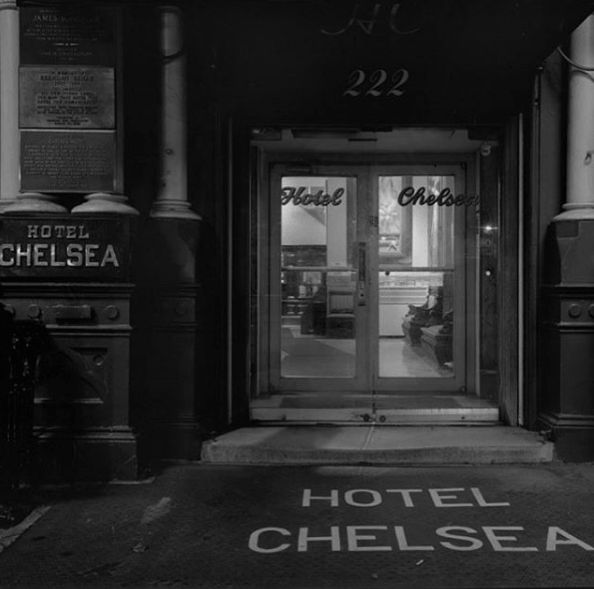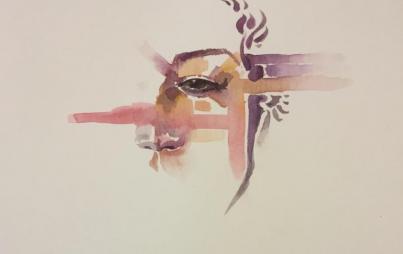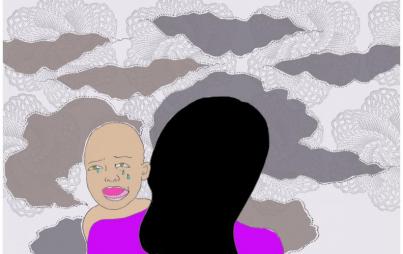
Image: Instagram/ roseganggg
When Barack Obama was elected President, my mother stopped talking to me for two weeks. “How could you have voted for that man?” she asked me right before the silence. “Don’t you love me? If you really loved me, you would not have voted for that man.”
Growing up, my mother joyfully told me how she hated hippies and bohemians. She loathed their feral smells, messy hair, bleeding hearts, and idle hands. In stories of her 1960s youth in blue collar Italian Queens, she bragged about pledging allegiance the loudest and wearing the whitest gloves; she respected authority with an almost disturbing zeal. Her work ethic was similarly monolithic. She had to go to work, she said, she couldn’t dawdle around drawing pictures like those slobs in the Village.
So I thought of my mother when I walked into The Chelsea Hotel to attend a memorial party for Leonard Cohen. She would suck her teeth and arch her meticulously drawn-on eyebrows if she knew I was tiptoeing around one of Manhattan’s last symbols of modern bohemian life.
This year, my mother voted for Donald Trump. My silence only lasted three days.
* * *
As an adolescent, I remember screaming at my mother frequently. I bristled early, around age 11. We did not have the kind of idyllic relationships she had hoped for. We were in constant conflict over musical tastes, clothing, friendships, family, and personal values. I felt oppressed by her demands — ripping my pigtails out on a cruise down the Hudson as a child, throwing myself down the stairs before fifth-grade picture day so I wouldn’t have to wear the ruffled blouse she picked out for me.
When I was 13, I started donning a ratty cardigan as a uniform of rebellion. It had belonged to my grandfather, who was not a nice man, and I had found it in the basement. This small resistance so irked my mother that she stole the cardigan one day, had it mended, and replaced it without telling me — as if I wouldn’t notice that the hole in the pocket was now neatly stitched. “My daughter dresses like a homeless person,” she bemoaned to her friends at monthly garden club meetings, and they would hold her hand and tell her that this phase would pass and we’d be shopping together at Bloomingdale's in no time.
To say I was a writer here, at Leonard Cohen’s memorial in the Chelsea Hotel, seemed wrong and a lie. Standing in the apartment — so perfectly like what an apartment in the Chelsea Hotel should look like, as if I had conjured it out of my subconscious fantasy — I felt not like a grown woman with a job and a husband and a bathtub that needed scrubbing; I was thirteen years old again and hugging the wall, unsure of where I belonged.
These and other paltry acts of rebellion seemed dire and vital at the time — as if I was locked in a battle for the salvation of a self. And perhaps I was. According to attachment theory, individuation from the mother is a crucial step towards healthy self-development. But sometimes, for a variety of reasons, a mother is not able to tolerate this separation. Dr. Karyl McBride notes how a parent might become preoccupied with how the child looks and performs rather than who the child is as a person. As a result, the child grows up insecure, not knowing who they really are or that their feelings are important; “[this insecurity] translates into adult life as the child grows, not trusting themselves or their own feelings and thus creat[ing] crippling self-doubt.”
During adolescence, my desperate attempts at articulating an identity threatened my mother’s sense of self and her rosy fantasies of what having a daughter should be like. I was not neat or precious or interested in driving around neighborhoods looking at the new “stunning” McMansions going up all around us. I was morbid; I had a strange sense of humor, I liked loud music, and I read depressing poetry.
Even now, I can’t help but think that I must have been a terrible disappointment for her, a real cog in her wheel of idealized motherhood.
* * *
The day of the Chelsea Hotel party, I wavered between wanting and not wanting to go. I had been having anxiety attacks all morning, hyperventilating into pillows and pacing my apartment. I had a feeling something awful would happen to ruin my idea of the place; someone would yell at me or tell me I didn’t belong. Who the fuck are you? Get the fuck out of here. Part of that anxiety was because I had not been personally invited. My friend was Facebook friends with the host, a photographer who still lives at the hotel, and she had run into him on the street the day before. He was welcoming and generous and asked her to attend and bring friends.
I have always preferred the dead, as they cannot disappoint. But it wasn’t the ghosts of The Chelsea that frightened me — it was the living tenants who seemed like appointed guardians of a hallowed space. I was terrified they would sniff me out for the imposter I was — the teacher who had her students read about New York City’s counterculture, but who was very much not even a peripheral part of any movement. I had, in fact, even rather recently, purchased linens at Bloomingdale's. And a crystal decanter by Rogaska. And a frock for a summer wedding at an upscale country club.
I went anyway.
* * *
I like Leonard Cohen’s music, but there was no way I deserved to be mingling with these very special people as they performed their formal mourning rituals — champagne, sage burning, sing-alongs. Walking inside, I felt like I had breached the antechamber of a tomb and that maybe I deserved to be cursed for the transgression. The door to the photographer’s apartment was open — or maybe there wasn’t even a door; I couldn’t tell — and red light spilled into the hallway. My friend introduced me as a writer, but I winced at the word when it left her mouth.
“I’m actually a teacher.”
To say I was a writer here, at Leonard Cohen’s memorial in the Chelsea Hotel, seemed wrong and a lie.
Standing in the apartment — so perfectly like what an apartment in the Chelsea Hotel should look like, as if I had conjured it out of my subconscious fantasy — I felt not like a grown woman with a job and a husband and a bathtub that needed scrubbing; I was thirteen years old again and hugging the wall, unsure of where I belonged.
I defaulted to old patterns of my bourgeoisie upbringing. I smiled, was polite, shook hands, and made pleasantries with the clever, eccentric darlings that waltzed in and seemed at ease. Posture ramrod straight, my hands resting in my lap, I felt like a talk show host in a temple, situated on a low stool in front of an even lower table decorated with sticks of burning incense, an animal skull, and religious figurines that seemed pilfered from a Catholic church in Naples. Frankly, my mother would have been proud of my comportment.
For most of the party, I spoke to a model’s mother who was a bit flummoxed by the chaos and by her chirpy daughter, who was skipping around the apartment. The mother was good-natured and chatty, and I unloaded all the small talk I could on her. Tell me about your garden, I insisted, and also about your stylish Eileen Fisher sweater and where you recently went on vacation. Tell me about dinner. Tell me about your daughter. You must be so proud of her.
Later, the model came up to me and smiled. “Thanks for talking to my mom. You totally didn’t have to do that.”
“Oh, I think it’s awesome you brought your mom here. My mom would think this place is scary. In fact, I kind of don’t know how to talk to her right now, so it was nice talking to someone else’s mom.”
* * *
The year Obama was re-elected, my mother gifted me a skull necklace. It was made of black and champagne diamonds, but it was a skull nonetheless. I was oddly touched. My mother is a generous gift-giver, but somehow her gifts never felt particularly suited for me. It always felt like she was giving me presents that she wanted me to want, that she might have wanted for herself.
“I hope you like it,” she said almost nervously. “I saw it and thought of you.”
When I wear the skull necklace that my mom gave me, I think of the struggles so many of us experience in navigating relationships, especially fraught relationships with our mothers. How do we meaningfully connect with our family, whom we love fiercely but cannot be authentic with, when we’re used to alternating silence and screaming? How can we express ourselves instead of always reacting to threats against our personhood?
The morning after the Leonard Cohen memorial, my hair smelled like patchouli, roses, and cigarettes. The aroma followed me around as I fussed with the Keurig, watered the plants, and set out bowls of dog food. I sat down with one of my favorite books about complex, dysfunctional family dynamics, The Drama of the Gifted Child by psychologist Alice Miller. The book flopped open to a well-trod page where I had underlined and starred a particular passage: “Now the once…silenced child can experience herself in a way she had never before thought possible, and afterward she can enjoy the relief of having taken the risk and been true to herself.”
It’s a satisfying line for a woman like me who grew up thinking only two disparate modes of expression existed: staying quiet or screaming.
My mother and I may never see eye to eye on politics, and our value systems may seldom align. Sometimes it feels like we try to breach this divide; other times we dig a deeper rift. I was hoping the Leonard Cohen memorial party at The Chelsea Hotel would give me some confirmation — that I truly belonged in the bohemian world of my youthful dreams and not at Bloomingdale's lunching with my mother.
But life is rarely that neat. All we can do is take the risk that being true to ourselves demands, whether we can tolerate the results or not.








